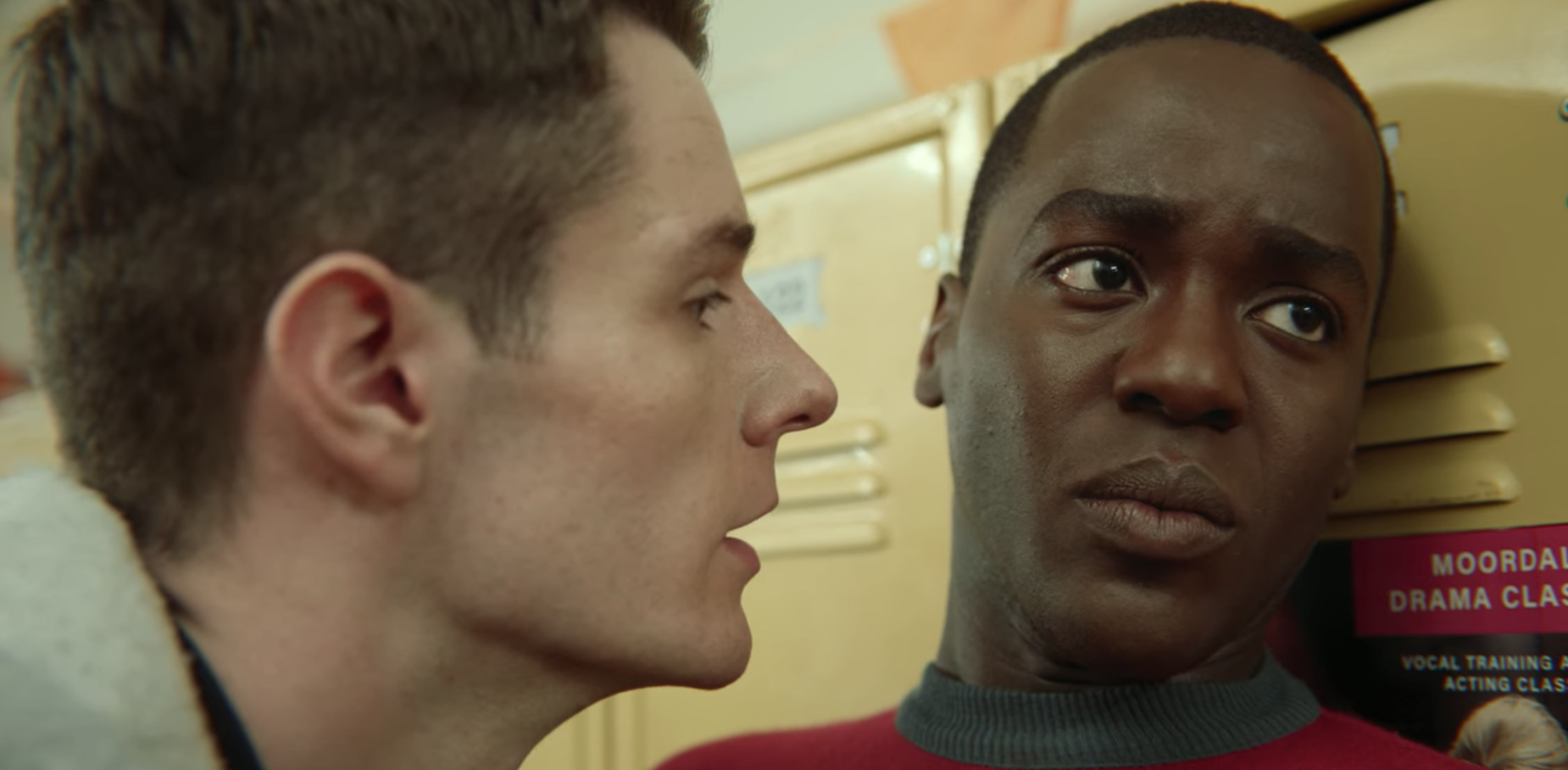Spoilers ahead for “Sex Education” Seasons 1 and 2
Netflix’s “Sex Education” returns on September 17 for its third season. The show, which focuses on teenager Otis and his high school classmates exploring sex and dealing with personal conflicts, has been praised for its frank treatment of topics like teen pregnancy, sexual assault, revenge porn, asexuality — the list goes on. But there’s one major way the show is failing its viewers, especially its queer audience.
One of the show’s most beloved characters is Eric, played by Ncuti Gatwa. Eric easily steals the show with his quick wit, iconic looks and heartbreaking storylines, including standing up to his Nigerian immigrant parents and asserting himself as a gay man, even in the face of bullying from his classmates.
His biggest bully is Adam, played by Connor Swindells. Adam is merciless toward Eric throughout the first season, tormenting him, calling him names, even getting into a physical altercation when the two are alone in detention. But that fight flips on its head halfway through, becoming a makeout sesh ending with Adam giving Eric a blowjob.
Their relationship is tumultuous from there to the end of Season 2 — plenty of on-again-off-again moments, other romantic interests, sneaking around, and shame — you get the gist. But when we last saw Adam and Eric, they were finally entering a public relationship for the first time. Long story short, Eric ended up with his bully.
Fans weren’t happy with this, myself included. Partially because Season 2 introduced Rahim, an out gay guy who was super into Eric, was proud to be seen with him, and, though he was a touch one-dimensional, was a decidedly healthier option for a partner. And partially because seeing Eric alone would be preferable to seeing him with Adam, considering the dangerous tropes their relationship perpetuates.
First up: Haggard’s Law. This is the idea that the more actively homophobic somebody is, the more likely they’re actually just secretly gay. Adam embodies this tired idea, going from bully to lover. But this only serves to excuse homophobic violence: “It wasn’t really his fault, he was just in the closet!” Abuse is abuse, people, and closeted or not, Adam was horrible to Eric. But that’s not the story the show wants to tell.
To create an outstanding and unique character like Eric only to limit his potential by sticking him with his bully — it’s disappointing at best and harmful at worst.
This goes hand in hand with the second reason this narrative is so harmful: the way it’s representing relationships between queer youth, specifically an interracial relationship. Like it or not, in centering an underrepresented dynamic, “Sex Education” faces the burden of representation. When one of the only gay interracial relationships a viewer has ever seen is this toxic, how might that shape their own internal biases?
Let’s not get it twisted — I can separate fact from fiction. I know that telling the story of an abuser is not the same as condoning an abuser’s actions. But I also believe “Sex Education” has a responsibility, or at least an opportunity, to create better representation with its massive platform. To create an outstanding and unique character like Eric only to limit his potential by sticking him with his bully — it’s disappointing at best and harmful at worst.
And I’m not alone in thinking that. On Thursday, Netflix tweeted a collage of Adam and Eric’s relationship with the caption, “You know what that’s called? GROWTH.”
You know what that’s called? GROWTH.
(📺 Sex Education) pic.twitter.com/fT2klEVvXt
— Netflix (@netflix) August 19, 2021
The replies were overwhelmingly disagreeing with Netflix’s description. Growth? Try abuse and manipulation.
some might also call it ABUSE and MANIPULATION. https://t.co/o9KP21njqo
— jordan • they/them 🏳️🌈 (@jd_occasionally) August 20, 2021
literally the opposite of growth, set black queer ppl back an entire century… https://t.co/IJtjLm889s
— Jazän ³³³ ᴺᴹ☾ᎤᏙᏒᏃᎡᎯ ᎠᏲᏟ☽™ ₃₃₃ (@lunaenbyjazan) August 20, 2021
I feel a very deep sense of rage every time I see these two together.
Falling in love with a man that humiliated and hurt you on purpose isn’t the kind of romance we can get behind, especially not for queer kids… https://t.co/Fes0MEn5oN
— shero (@rugimuch) August 21, 2021
This is why so many young queer kids believe their bullies secretly like them when in reality they just hate gay people. Tropes like these are dangerous https://t.co/SvQ2AkQdNW
— elijah🐰 Sorry Monkey Hoe (@thebeesdaddy) August 21, 2021
Luckily, the story’s not over. Season 3 is almost here, and we don’t know if it will be the final season. I’m excited to see what path Eric and Adam will follow moving forward. I hope they can both get an ending they deserve — just maybe not one where they end up together.
Don't forget to share:
Help make sure LGBTQ+ stories are being told...
We can't rely on mainstream media to tell our stories. That's why we don't lock our articles behind a paywall. Will you support our mission with a contribution today?
Cancel anytime · Proudly LGBTQ+ owned and operated
Read More in Entertainment
The Latest on INTO
Subscribe to get a twice-weekly dose of queer news, updates, and insights from the INTO team.
in Your Inbox













